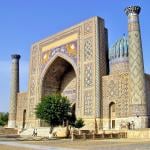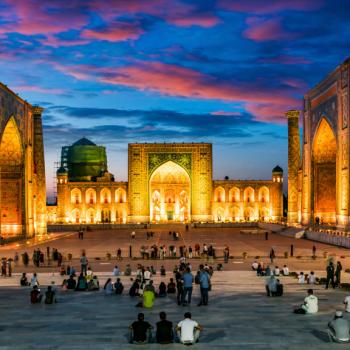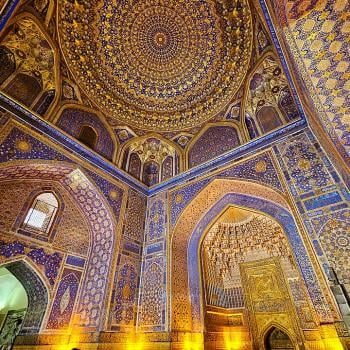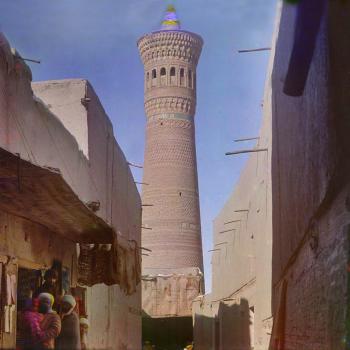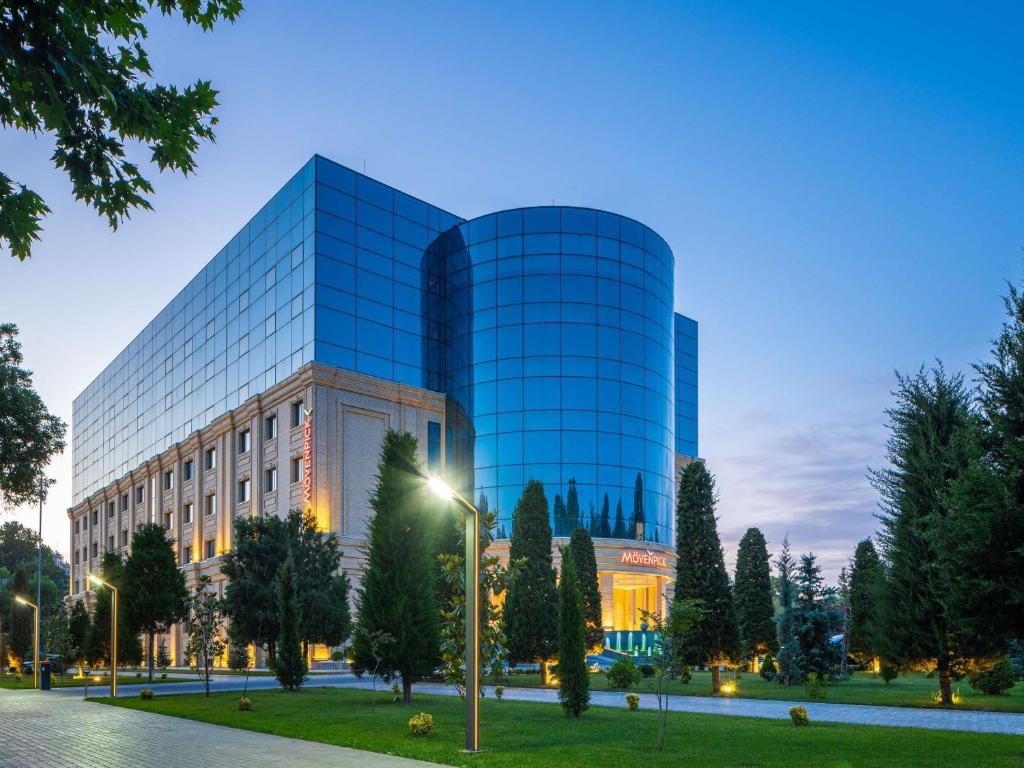
I was the respondent in the first full, public session of the conference today. (The overall conference title is “Diplomacy of the Heart: The Power of Intercultural Dialogue and Education in Peacebuilding.”) Given the fact, as discovered and announced over on the Peterson Obsession Board, that I’m a religious and cultural bigot and something of a white supremacist who despises all things non-Western, it’s not at all clear to me why I was invited to participate in such meetings. And given my alleged attitude toward people who are religiously and ethnically different from myself, one can — heck, I can — only imagine my painful discomfort at being surrounded by such folks and at being obliged to actually interact with them. Still, I think that my part in this morning’s opening session went reasonably well, and I enjoyed the presentations to which I responded. This first session was titled “Religion as a Foundation for Peacebuilding: Exploring Its Potential and Challenges.” Ravan Hasanov, who is Executive Director of the Baku International Multiculturalism Centre in Azerbaijan, chaired the proceedings.
- The first presentation, on “Quran and the Role of Religious Leaders in Global Leadership,” was given by Muhammad Eslami, of the Islamic Science and Culture Academy (ISCA), in Qum, Iran. He was one of the four Iranian Shi‘is who participated in our marathon closed-door session yesterday. By the way, Qum (or Qom) is considered a holy city in Twelver Shi’a Islam — by far the majority Shi’a “denomination” — and is a significant pilgrimage destination: Roughly twenty million pilgrims visit the city annually. It is also the largest center for Shi’a scholarship in the world.
- Agil Shirinov, the Rector of the Azerbaijan Institute of Theology, spoke on “The Role of Theological Education Institutions in Promoting Mutual Understanding Between Different Religions.”
- Anar Gafarov, who heads the Department of Religious Sciences at the Azerbaijan Institute of Theology, delivered separate remarks on the role of theology and philosophy in either hindering or helping good relations between human groups. (His presentation was not on the program as one distinct from Professor Shirinov’s preceding paper, so I don’t have a title for it.)
- Professor Mahdi Fadaei Mehrabani, of the University of Tehran, who was also one of the participants in yesterday’s closed-door discussion, gave a presentation on “Peacefulness: The Lost Continent of Religions in the Modern World.”
- My response followed.
The second session of the morning, which went until lunch, was devoted to the theme of “Diplomacy of the Heart: Integrating Literature, Law, and Religion in Regional Dialogue and Peacebuilding,” and was chaired by Mehran Kamrava, who is based at Georgetown University’s campus in Qatar. Three presentations were given:
- “The Role of Ferdowsi’s Shahnameh in Linking Civil Societies in Central Asia and the Middle East within the Framework of Neo-Regionalism Theory,” by Mandana Tishehyar of the Department of Regional Studies in Iran’s Allameh Tabataba’i University. (In conversation with Professor Tishehyar, by the way, I discover that she shares my lack of admiration for Timur-i Leng.)
- “Human Dignity: A Legal Perspective for Diplomacy of the Heart,” by the Iranian-born Shima Baradaran Baughman, who is Woodruff J. Deem Professor of Law and a Distinguished Fellow at Brigham Young University.
- “Championing Human Dignity through International Studies Programming,” by Quinn Mecham, who is a professor in, and the Associate Director of, the Kennedy Center for International Studies at Brigham Young University.
The main afternoon session was conducted under the theme “From Legal Frameworks to Human Connection: Empathy, Law, and the Pedagogy of Peace.” It was chaired by W. Cole Durham, Jr., who was the founding director of the International Center for Law and Religion Studies at Brigham Young University and who currently serves as the president of the G20 Interfaith Forum Association. These were the four presentations that were given during the session:
- “The Historical Evolution of Islamic Law in Central Asia and Its Significance for Contemporary Peacebuilding,” by Abdumukhtor Rahmonov of the Tashkent State University of Law, which is located in the capital city of Usbekistan, Tashkent.
- “Coexistence from an Islamic Perspective,” by Mohammad Sahhaf Kashani, who comes from the Islamic Science and Culture Academy, in Qum, Iran.
- “Preserving Sacred Spaces: The Role of International Law in Protecting Religious Heritage and Promoting Peace,” presented by Peter Petkoff, who is Tutorial Law Fellow at Regent’s Park College of the University of Oxford.
- “Reimagining Legal Education in the Age of Artificial Intelligence: How AI is Transforming Legal Education,” by Shokhrukhbek Tillaboev of Tashkent State University of Law.
I’m impressed, incidentally, with some of the things that I’m learning about contemporary, post-Soviet, independent Uzbekistan. Here is one group of factoids, shared by one of today’s speakers, that caught my attention: The nation’s schools teach in seven languages, radio and television broadcasts are aired in twelve languages, and newspapers appear in ten languages.
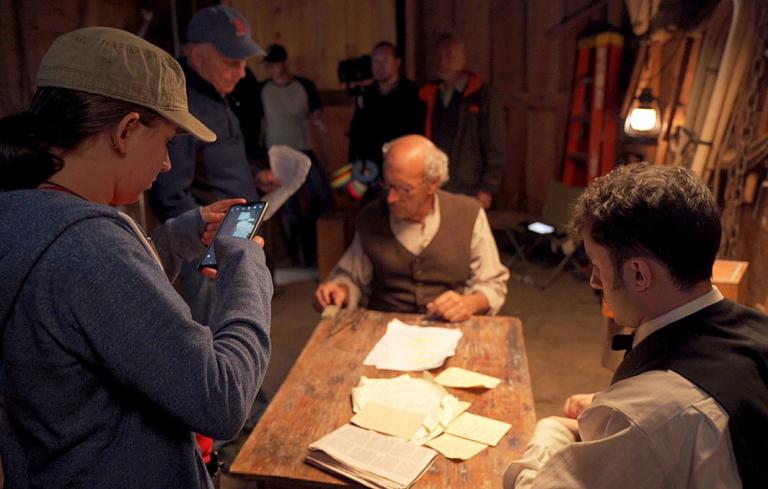
You may recognize Paul Wuthrich, the actor who plays the lead in the new movie Raising the Bar: The Alma Richards Story, from his prominent roles in the Interpreter Foundation films Witnesses, Undaunted Witnesses of the Book of Mormon, and Six Days in August, as well as from the previous T. C. Christensen movie Escape from Germany. See “First Latter-day Saint gold medalist’s story hits the big screen: ‘Raising the Bar’ tells the ageless story of Utah farm boy Alma Richards winning the Olympic high jump in 1912.”
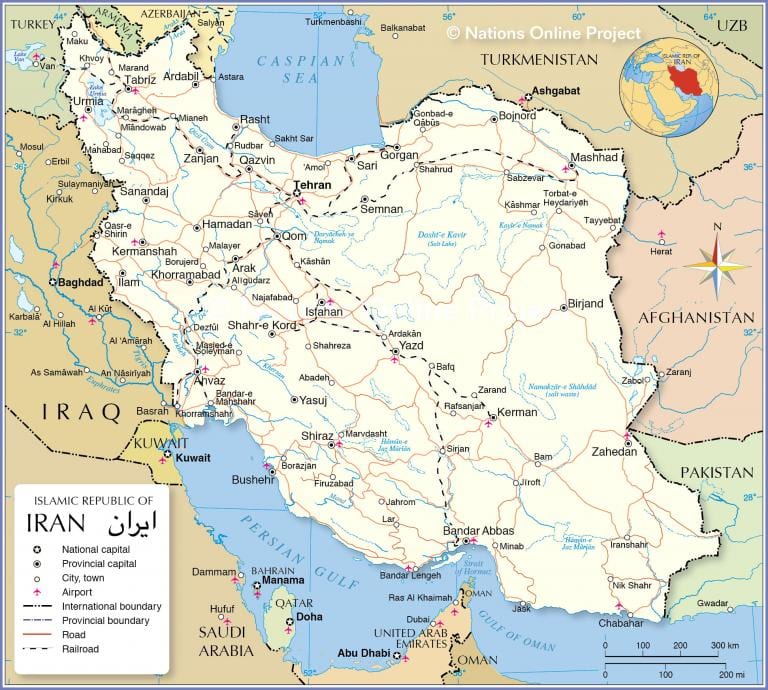
As I noted in a previous post, I flew over this area (the Iranian port city of Bandar Abbas) on Saturday night, traveling from Dubai to Samarkand. The event now seems to me more than a little bit suspicious, at least at first blush:
At least 40 people were killed and more than 1,000 injured on Saturday at the Shahid Rajaee port in southern Iran, as a shipment of a chemical used to make missile propellant exploded. The shipment of sodium perchlorate, which reportedly had arrived in two ships from China earlier this year and was being stored in the port, was meant to help replenish Iran’s missile stocks, depleted from strikes on Israel. The exact cause of the explosion remained unclear.
While the injuries and the loss of life are obviously deeply regrettable, it doesn’t upset me to learn that Iran’s supply of deployable missiles may have been at least temporarily reduced.
Posted from Samarkand, Uzbekistan



